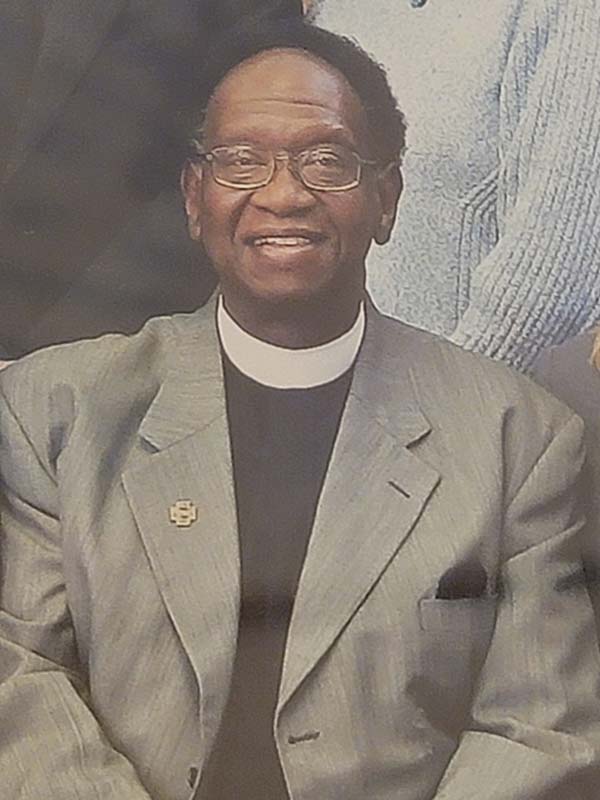Rev. Dr. Walter May Jr. Finds Joy in Community

Rev. Dr. Walter May Jr. was serving as a youth director when his wife’s words changed his life forever.
“Out of the blue, she said, ‘You’re going to be an ordained minister,’” Dr. May, MDiv ’87, DMin ’96, remembers. “I laughed and said, ‘Really? Do you know me?’”
As he considered this unexpected call to ministry, Dr. May had his doubts. He felt like he needed an experience similar to Martin Luther’s calling to be sure. But shortly after his wife’s proclamation, the bishop’s assistant, Cy Warnerman invited him to consider seminary – before it was too late.
“We’ve had our eye on you, and you’re not getting any younger,” Warnerman candidly told him. This forthcoming admission caught Dr. May’s attention and forced him to reconsider his long-held beliefs about what a divine calling should be.
Before making his final decision, Dr. May sought advice from Grover Wright, a prominent figure in the African American Lutheran community, and a staff member at the ELCA national church office in Philadelphia. The meeting with Grover further reshaped Walter’s perspective on the nature of God’s call.
“How many people have said that you need to be a pastor?” Wright asked him.
“Quite a few,” Dr. May admitted.
Wright leaned in. “You don’t see that as God calling you?”
His conversation with Wright was enough to inspire Dr. May to attend a seminary weekend at the Lutheran School of Theology of Chicago. There, he immersed himself in seminary life, attending classes, meeting staff and spending time with professors.
That weekend, Dr. May felt sense of belonging that solidified his decision.
Dr. May’s academic focus and experiences at LSTC extended beyond the classroom. Under the guidance of his advisor, Dr. Albert “Pete” Pero, he participated in weekend immersions exploring African American, Latino, and Asian communities.
These hands-on experiences opened his eyes to the diversity within Lutheranism and helped to prepare him for the multifaceted pastoral journey he embarked on after graduation.
“When I graduated, I accepted a call at Christ the Mediator in Chicago,” Dr. May remembers. “There were eight candidates ahead of me and I eventually learned that the other eight candidates couldn’t chant the liturgy!”
Well-versed in liturgical prayer and practice, Dr. May easily impressed the community and stayed at Christ the Mediator until he was called again to First Lutheran in Cedar Rapids, IA.
Going from a 300-member congregation to one that had over 3,000 members proved to be a significant change for Dr. May, who was eager to embrace this new challenge. To set him up for success, First Lutheran supported Dr. May in returning to LSTC to earn a MMin in pastoral care and counseling.
“For the most part, LSTC was the same when I went back,” Dr. May said, “Even though there was a ten-year difference from the first time I attended seminary.”
While earning his DMin, under advisor and John H. Tietjen Professor of Pastoral Ministry and Pastoral Theology, and Emerita Professor Kadi Billman, Dr. May continued to build his community, building lifelong connections with his peers there.
Dr. May’s connection to LSTC has continued to grow over time. After graduation he became a member of the Alumni Senate, staying aligned with the institution’s growth and changes. He was nominated to the LSTC Board of Directors in 1996 and was a member of the committee that selected and welcomed James Echols as president.
Eventually, Dr. May transitioned to the role of assistant to the bishop in the Southeast Iowa Synod where he continued to make a meaningful impact. Over his 12 years of service there, he engaged with pastors, interviewed new candidates, and navigated the rich tapestry of Lutheranism in the region.
Dr. May oversaw a staff of 12 people, who worked closely in the synod office. Together, the group was able to forge connections with congregations across the synod, problem solve and provide support for the synod as a whole.
“When we weren’t in the office, we were traveling,” Dr May remembers. “It was a collective, if you will, of outgoing people who met on a regular basis and formed a kind of family.”
Dr. May’s work as assistant to the bishop continued to keep him close to his roots at LSTC.
“I got the chance to interact with a lot of pastors, and many of them were graduates of LSTC, serving congregations,” he shared.
Dr. May was also in charge of interviewing new pastors who came into the synod. “I was happy to interview quite a few LSTC alumni and see that many of their congregations employed LSTC student interns.”
Dr. May’s ongoing partnership with LSTC alumni let him see firsthand the ways in the LSTC study body is committed to living their values in the world.